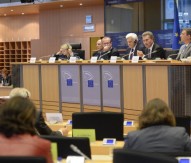
IMI’s Intellectual Property
The Innovative Medicines Initiative (IMI) is Europe’s largest public private partnership. Focusing on speeding up the development and delivery of new and more effective drugs and medicines, the initiative sees the European Commission and the continent’s pharmaceutical industry join forces in a €2bn venture.
Established under FP7, the JTI concentrates on the advancement of better and safer medicines for patients. The initiative has brought together an estimated 4,500 researchers working on 40 on-going projects. The PPP will receive a funding boost worth €3.45bn as part of Horizon 2020, sourced equally between the European Commission and the European pharmaceutical industry. IMI2 will run until 2024.
Michel Goldman is the executive director of IMI. Answering questions at the ‘Joint Technology Initiatives – Innovation in Action’ event at the European Parliament in Brussels, and attended by Horizon 2020 Projects, he began by outlining solutions to two major challenges facing the European pharmaceutical industry, namely simplification and communication.
“First we must further simplify what we have done in the past. We must really streamline processes to make things easier, especially for SMEs. For example, when we launched IMI, we began with one call. Now, we launch one call for proposals as soon as the topic is ready. This makes a huge difference – we launched four calls for proposals during 2012.
“We also need to communicate more clearly to our general audience, but also to people inside companies. We realise that inside industry, this JTI is not well known enough and we still struggle to attract the best partners in industry. This is true in both large member states, which are recognised to be active in the pharmaceutical sector, but also in those countries that are less involved in healthcare sector research, where it is critical to attract the best scientists and clinical teams. We are taking action through member state representatives and ambassadors that we have identified following the launch of our proposal.”
Intellectual property
The collaborative development of new medicines has a palpable influence on intellectual property (IP). Speaking to the audience of journalists, Goldman said challenging negotiations had taken place with industry partners prior to the JTI’s creation.
“When IMI was launched there was a number of difficult discussions with EU member states, the idea being to avoid large pharmaceutical companies just capturing the knowledge discussed. I think we developed an IP policy in such a way that can only be described as ‘flexible’. You cannot organise an IP policy that meets all the details – it really depends on the nature of the project. We have introduced this flexibility so that we reward those who are at the origin of the discovery – a fundamental principal. We organise things in a way that ensures that when results are obtained, they can be exploited in the best possible way.
“To give an example, we must avoid ‘explicit license’ as much as possible. In business, you sometimes ask for exclusivity – not to develop a project, but to just develop a common interest. This is something we want to avoid and that’s the reason why we do everything we can in the agreements to favour non-exclusivity.”
Goldman continued by placing the IP principal in context.
“An example: the European pharmaceutical ‘factory’ is something unique in the world. We have thousands of components which are drug candidates – we don’t know if they will become a drug, but they are serious candidates. Those candidates are everywhere – they are in the fridges of universities, in companies, and in this ‘factory.’ There is a single centre where everyone is putting their components together and partners will indeed agree on how the IP will be shared or how the exploitation will be done – they find a way to reward all those contributing. This process has taken a long time to develop, but it was achieved. I think that in the IMI model there is this idea of collaboration, but also the idea on how to share the benefits of this collaboration.”
Future
IMI2 will bring together members of the European Federation of Pharmaceutical Industries and Associations and will also be open to universities, major corporations, SMEs and patient groups. The PPP will have a number of core goals and will aim to deliver: a 30% increased success rate in clinical trials of key World Health Organization priority medicines; clinical proof of concept in immunological, respiratory, neurological and neurodegenerative diseases within five years; and the development of two new medicines for Alzheimer’s disease.
“We will have important activities in the next few months and early 2014. One likely important project we expect to launch will be related to dementia, to Alzheimer’s. We have already have three projects but we hope to launch an impressive trial which will be the first initiative in the world of this type with all companies putting resources together to test the new components for this terrible disease,” Goldman said.
“We will certainly continue to invest in the development of new antibiotics and you will see an increasing number of IMI projects related to access for patients to new drugs. It is not enough to have a new component approved by the regulators but then not have someone to pay for it.”
Goldman called for new business models and new ways to facilitate access of new drugs to patients to overcome this issue. IMI2 is expected to launch in January 2014.




